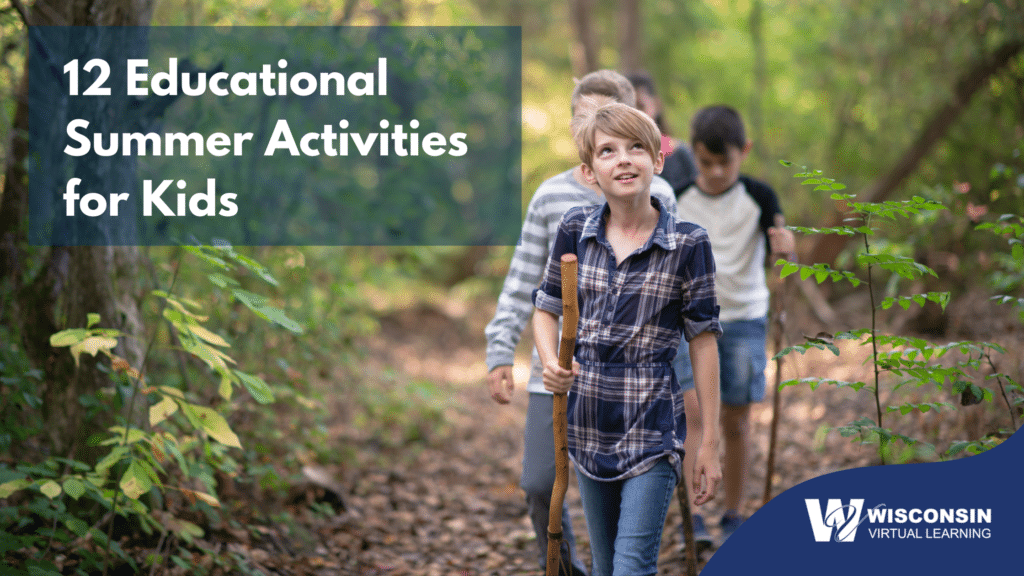As summer break approaches, parents and guardians of young learners face a daunting challenge: preventing the “summer slide”—the learning loss that can occur over summer vacation. Fortunately, making time for a few enriching summer activities and encouraging key hobbies can offset any brain drain during this season. You can maintain and even advance their academic skills by keeping young students engaged in these exciting and educational summer activities.
The following list gives ideas for some fun-filled adventures that will keep young minds active and prepare them for the upcoming school year in a way that they will remember for a long time.
1. Take a Nature Walk
Nature walks provide an excellent chance for kids to learn about local flora and fauna. Turn your walks into educational adventures by equipping a field guide or nature app and encourage kids to keep journals of what they observe in nature.
Depending on your child’s age, you could also choose a color and ask them to write down everything they see that matches that color – think of it like a colorful scavenger hunt!
2. Enjoy Local Library Programs
Summer reading programs and workshops are a popular way for libraries to keep children engaged with books and storytelling during the summer months. These programs offer a range of activities and resources designed to help children improve their literacy skills and develop a love for reading.
For example, some libraries host reading challenges where children are encouraged to read a certain number of books before the end of the summer. Others offer workshops that teach children how to write their own stories or create illustrations for their favorite books.
Additionally, some programs bring in guest speakers or performers to share their love of reading and inspire children to explore new genres and authors.
3. Go on a Virtual Tour at a Museum or Art Gallery
If traveling isn’t an option, explore virtual tours of museums. Many institutions worldwide offer online resources that allow kids to learn about art, history, and science from home.
These 12 world-famous museums offer virtual tours for free or you can virtually travel to the likes of London, Amsterdam, New York City, and even Rome with these 10+ virtual gallery tours.
4. Try a Science Experiment at Home
Set up simple experiments using household items to teach children about basic scientific concepts like density, gravity, and chemical reactions.
5. Cook and Bake
Cooking and baking are practical ways to teach math (measuring ingredients), science (how heat changes things), and reading (following recipes). Plus, the end result sure is tasty!
6. Get Crafting!
Encourage creativity with art projects that also teach skills such as color theory, perspective, and design. Materials can be as simple as recycled goods or craft supplies.
7. Keep a Journal or Write Stories
Have your children start a summer journal or write stories about their experiences. This encourages creativity, boosts writing skills, and can be a great keepsake of their summer vacation.
8. Enjoy Puzzles and Board Games
Games that require problem-solving skills, such as puzzles or strategy board games, can be both fun and mentally stimulating, especially when the whole family joins in for the fun.
9. Learn a New Instrument
If your learner has an ear for music, summer is a great time to start learning an instrument! Many online platforms offer beginner lessons if there are no instructors in your immediate area. Alternatively, there are so many great video tutorials available on YouTube for any instrument under the sun.
10. Get Active
Engaging in sports keeps children physically active and teaches them about teamwork, strategy, and personal discipline. Keep an eye out for local leagues and programs.
11. Act in Historical Reenactments or Role-Play
Participate in or create your own historical reenactments! These events and similar experiences, like living history museums, can be a fun way to learn about history while encouraging public speaking and performance skills.
12. Enroll in Technology and Coding Camps
Consider enrolling your child in a coding camp or an online coding course during the school break. These programs can provide a valuable learning experience that teaches important computer and problem-solving skills.
Not only can coding help your child develop a deeper understanding of technology and how it works, but it can also give them the tools to create their own programs and apps.
Additionally, coding can help improve critical thinking and logical reasoning abilities, which are useful skills in many areas of life.
Each of these summer activities supports the unique offerings of Wisconsin Virtual Learning, ensuring that education continues to be engaging and interactive, even during the summer. As an all-online public school, Wisconsin Virtual Learning provides expansive educational opportunities to every student. Your active involvement in exploring these educational activities can enrich your child’s summer. With each activity, they can learn something new, keeping their minds sharp and ready for the upcoming school year. Learn more about the enriching educational experiences offered by Wisconsin Virtual Learning today.

